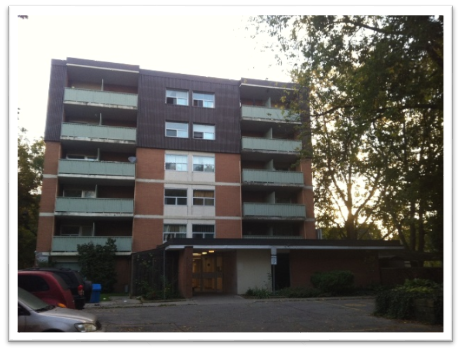 CMHA Middlesex shared an innovative model of supportive housing with conference delegates with a presentation on the genesis, development, goals and outcomes of the Supportive Living Apartments on William Street, London. CMHA Middlesex developed the Supportive Living Apartments model by ‘re-purposing’ funds originally used by a traditional residential program known as Homes for Special Care (a custodial-type housing program with few supports). Supportive Living Apartments program has an overarching goal of community reintegration, focusing on a person-centred recovery philosophy that encourages independence and self-care for those with long-term mental illnesses. To stop the revolving door experience of so many clients with mental health issues, CMHA Middlesex Supportive Living Apartments developed a new model of supportive housing in the community that involved providing onsite support to individuals where they live. The target population was individuals who have never been able to maintain any community tenure with regard to housing and groups and activities.
CMHA Middlesex shared an innovative model of supportive housing with conference delegates with a presentation on the genesis, development, goals and outcomes of the Supportive Living Apartments on William Street, London. CMHA Middlesex developed the Supportive Living Apartments model by ‘re-purposing’ funds originally used by a traditional residential program known as Homes for Special Care (a custodial-type housing program with few supports). Supportive Living Apartments program has an overarching goal of community reintegration, focusing on a person-centred recovery philosophy that encourages independence and self-care for those with long-term mental illnesses. To stop the revolving door experience of so many clients with mental health issues, CMHA Middlesex Supportive Living Apartments developed a new model of supportive housing in the community that involved providing onsite support to individuals where they live. The target population was individuals who have never been able to maintain any community tenure with regard to housing and groups and activities.
CMHA Middlesex partnered with London Middlesex Housing Commission (LMHC) to secure units scattered throughout a building. The 22 units are permanent, fully furnished and rent is geared to income. To be eligible, individuals must be able to live independently and maintain basic daily living skills or agree to coordinated community care. Most importantly, a past history of poor tenancy or having rent in arrears is not a barrier to eligibility.
 The program operates with a strong focus on the ‘whole person’ within a self-care psychosocial and recovery model. Client needs are paramount. Client needs are assessed using the Ontario Common Assessment of Need (OCAN) tool and this tool helps to determine mutually agreed-upon person-centred goals for the client.
The program operates with a strong focus on the ‘whole person’ within a self-care psychosocial and recovery model. Client needs are paramount. Client needs are assessed using the Ontario Common Assessment of Need (OCAN) tool and this tool helps to determine mutually agreed-upon person-centred goals for the client.
CMHA Middlesex provides support Monday to Friday 9am to 8pm and on weekends from 10am to 6pm. Staff of the program work with their clients to develop groups and services, based on participant feedback and ongoing current needs. The goals of the groups are person-driven and based on strengths, needs, abilities and preferences of the person served. Surveys are provided to attendees as needed for feedback on improving or adding new services.
A unique feature of this program is the encouragement of peer-led groups. Staff shared that tenant willingness to participate in the various groups is the key to ensuring that they meet their individual goals for recovery. Given the importance of promoting self-care, residents are responsible for the management and storage of their own medications, although nurses are available 5 days per week to administer injections on site. Staff also provide other health services, such as diabetes management, smoking cessation as well as yoga classes and facilitating social and recreational outings. Clients of the program are encouraged to seek out and maintain communication with other residents of the building, which helps to promote a sense of belonging and integration in the community.
Two current residents of Supportive Living Apartments shared their stories during the session. Both clients described their past lives as being a revolving door of repeat hospitalizations, frequent involvement with the justice system, chronically inadequate accommodation and no sense of belonging in a community. Life in Supportive Living Apartments has been transformative: having permanent housing, a higher quality of life, a decrease in use of emergency services and an improved sense of belonging and acceptance in the community. All this is achieved at the low cost of $45 per day per individual.
The Supportive Living Apartments model by CMHA Middlesex can serve as a useful model for transforming traditional housing options for people with mental health issues towards a model that offers permanent housing, promotes independence, offers client’s choice and encourages community integration.
For more information on supportive housing at CMHA Middlesex, visit their website.